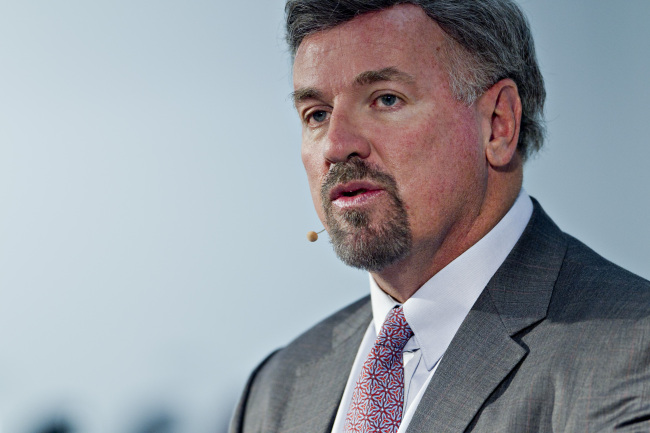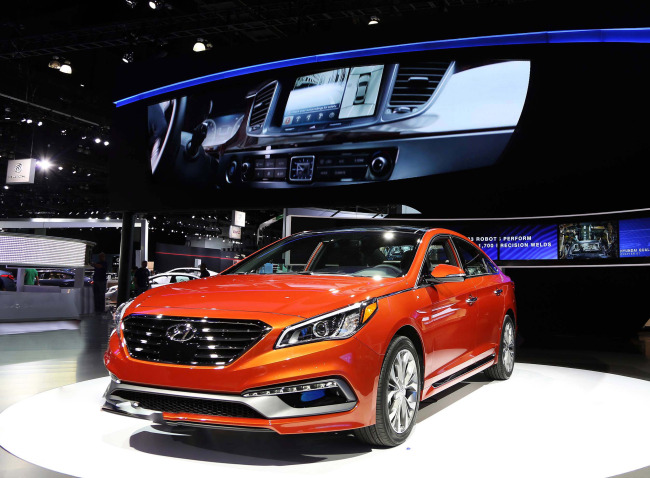LOS ANGELES ― Hyundai Motor America CEO Dave Zuchowiski on Wednesday dismissed claims that the carmaker’s fuel efficiency disputes would have any business impact on consumer sentiment and car sales.
“It’s something between us and the government. It didn’t affect consumers and dealers at all,” he said at a Hyundai booth during the LA Auto Show that kicked off in the U.S. city on Tuesday.
“The news hit the headlines for 24 hours, then it was gone. We are just glad to get it behind us.”
Early this month Hyundai Motor and its affiliate Kia Motors agreed to pay a combined $300 million in penalties in the United States for overstating fuel economy ratings of their vehicles. It was the largest penalty slapped on a carmaker by the U.S. Environment Protection Agency.
Hyundai said the discrepancy between the EPA’s fuel economy estimates and its own had to do with differing interpretations of the test procedures.
As part of the settlement with the EPA, the two carmakers will spend about $50 million on measures to prevent future violations. They are also said to be considering a new fuel-efficiency testing facility in the United States.
The U.S. chief showed confidence in hitting an all-time high in sales this year since the carmaker entered the market 25 years ago.

Hyundai Motor America CEO Dave Zuchowiski. (Bloomberg)
“It’s been a good year,” said Zuchowiski, who took the top post on Jan. 1. “Our growth has slowed down a little. Most of the dynamic growth in the market has been on the truck side but we are largely a car-centric brand.”

A Hyundai Sonata stands at the carmaker’s booth during the LA Auto Show on Wednesday. (Hyundai Motor)
“We’ve got the new Genesis that is very, very well received, and the Sonata which was launched this summer is picking up a lot of steam. With new cars coming, we feel good about long-term prospects,” he said.
In the first 10 months of this year, Hyundai and Sonata sold a record 661,847 vehicles in the U.S. market, up 3.7 percent from the same period last year.
Renewed push for green cars
Before this year’s L.A. motor show, the Korean duo announced an ambitious plan to become the No. 2 player in the global eco-friendly car market. As part of this, they pledged to expand their green car lineups from the current seven models to a total of 22 by 2020.
Reflecting their renewed push for green cars, officials at the Hyundai and Kia booths also seemed to be working harder to promote their latest zero-emission vehicles to visiting media and industry people.
The hydrogen-powered Hyundai Tucson made its U.S. debut in June. The carmaker predicted more than 60 unit sales by the end of this year.
Based virtually on the same powertrain as the gasoline version, the fuel cell Tucson can drive 549 kilometers on a single charge. Water is the only substance that the car emits from its tailpipe.
Its U.S. success is expected to be a real litmus test to gauge whether a fuel cell model could achieve mass-market acceptance.
“Hydrogen has the best potential to replace any vehicle type and vehicle size, unlike electric vehicles, which are always small due to the battery,” said Mike O’Brien, vice president of product and planning of Hyundai Motor America.
In the U.S., which offers generous incentives for green cars, the fuel cell Tucson leases for $499 per month, including unlimited hydrogen refueling, for a 36-month term, with a $2,999 down payment.
Along with the hefty price tag, a lack of hydrogen refueling stations is a challenge, he said.
Kia is also pinning high hopes on the Soul EV, the full-electric version of its second-best-selling car, which hit the U.S. market in October.
The key plus point of the Kia EV is its driving range, along with its distinctive cute styling, said Michael Sprague, the Kia sales chief. It can drive 149 kilometers on a single charge ― the industry’s second-highest only behind Tesla electric sports cars.
“The higher driving range gives drivers peace of mind, which is very important,” he said.
During the three-day motor show, Hyundai and Kia displayed seven and 40 vehicles, respectively. The new Kia Sorento sport utility vehicle was unveiled there before its official launch early next year in the U.S.
By Lee Ji-yoon, Korea Herald correspondent
(jylee@heraldcorp.com)




![[KH Explains] No more 'Michael' at Kakao Games](http://res.heraldm.com/phpwas/restmb_idxmake.php?idx=645&simg=/content/image/2024/04/28/20240428050183_0.jpg&u=20240428180321)


